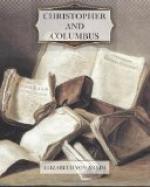Anna-Felicitas said she hadn’t any doubts really, but that she was very hungry, not having had anything that could be called a meal since breakfast, and that she felt like the sheep in “Lycidas,” the hungry ones who looked up and were not fed, and she quoted the lines in case Anna-Rose didn’t recollect them (which Anna-Rose deplored, for she knew the lines by heart, and if there was any quoting to be done liked to do it herself), and said she felt just like that,—“Empty,” said Anna-Felicitas, “and yet swollen. When do you suppose people have food on board ships? I don’t believe we’d mind nearly so much about—oh well, about leaving England, if it was after dinner.”
“I’m not minding leaving England,” said Anna-Rose quickly. “At least, not more than’s just proper.”
“Oh, no more am I, of course,” said Anna-Felicitas airily. “Except what’s proper.”
“And even if we were feeling it dreadfully,” said Anna-Rose, with a little catch in her voice, “which, of course, we’re not, dinner wouldn’t make any difference. Dinner doesn’t alter fundamentals.”
“But it helps one to bear them,” said Anna-Felicitas.
“Bear!” repeated Anna-Rose, her chin in the air. “We haven’t got much to bear. Don’t let me hear you talk of bearing things, Anna-F.”
“I won’t after dinner,” promised Anna-Felicitas.
They thought perhaps they had better ask somebody whether there wouldn’t soon be something to eat, but the other passengers had all disappeared. They were by themselves on the gloomy deck, and there were no lights. The row of cabin windows along the wall were closely shuttered, and the door they had come through when first they came on deck was shut too, and they couldn’t find it in the dark. It seemed so odd to be feeling along a wall for a door they knew was there and not be able to find it, that they began to laugh; and the undiscoverable door cheered them up more than anything that had happened since seeing the last of Uncle Arthur.
“It’s like a game,” said Anna-Rose, patting her hands softly and vainly along the wall beneath the shuttered windows.
“It’s like something in ‘Alice in Wonderland,’” said Anna-Felicitas, following in her tracks.
A figure loomed through the mist and came toward them. They left off patting, and stiffened into straight and motionless dignity against the wall till it should have passed. But it didn’t pass. It was a male figure in a peaked cap, probably a steward, they thought, and it stopped in front of them and said in an American voice, “Hello.”
Anna-Rose cast rapidly about in her mind for the proper form of reply to Hello.
Anna-Felicitas, instinctively responsive to example murmured “Hello” back again.
Anna-Rose, feeling sure that nobody ought to say just Hello to people they had never seen before, and that Aunt Alice would think they had brought it on themselves by being conspicuous, decided that perhaps “Good-evening” would regulate the situation, and said it.




